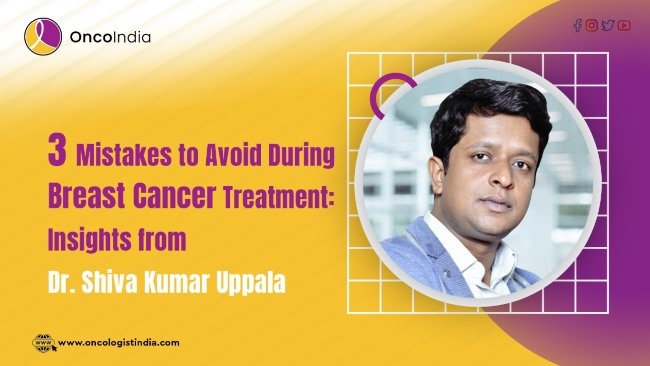Dr. Shiva Kumar Uppala, the senior consultant surgical oncologist at Oncolndia, Bangalore, talks about the various misconceptions and mistakes that patients make while dealing with breast cancer.

The first cardinal mistake that people make is to ignore the symptoms. “Listening to your body is very important while dealing with breast cancer,” believes Dr. Shiva Kumar. Any small changes in your breast, as mentioned in ‘Early Detection is half the battle in breast cancer survival’, might be an indication of breast cancer and must be shown to a doctor.
“Fear of side effects caused by chemotherapy, radiotherapy, surgeries, etc pushes people to look for other forms of treatment. This is a dangerous trend,” says Dr. Shiva Kumar. Most of these patients come back with advanced stages of breast cancer, at which time treatment becomes very difficult.
The next biggest mistake one can make is to stop your follow-up visits after being cancer free for a couple of years. Cancer is a disease that requires continuous follow-up to avoid relapses. “Once you had cancer and had treatment, follow-ups become part of your life,” says Dr. Shiva Kumar. He recommends regular follow-ups once every 6 months or once a year to check for cancer recurrences or second cancers.
What is worse? Chemotherapy or fear or chemotherapy?
Fear of chemotherapy is definitely worse, believes Dr. Shiva Kumar. “The problem is that people tend to avoid chemotherapy fearing side effects. It takes a lot of convincing and cajoling to make patients agree to adjuvant chemotherapy,” says Dr. Shiva Kumar. In some cases, patients simply refuse to follow the treatment plan required after the surgery because they assume that the surgery has taken care of the cancer. Unfortunately, this is not true, as some patients learn it the hard way.
Why it is important to follow doctor’s orders?
A 55-year-old patient, Kamala (name changed), from Gulbarga is a perfect example to showcase how important it is to follow your doctor’s advice. Kamala had stage 1 breast cancer and had a lumpectomy to remove the tumor and surrounding lymph nodes. Dr. Shiva Kumar recommended 6-8 weeks of adjuvant chemotherapy to prevent relapses. However, Kamala was adamant about not taking chemotherapy. Despite continuous warnings, she refused to take chemotherapy due to fear of side effects.
“Though surgery removes the bulk of cancer cells in and around the tumor, some cells might remain in the body. These remaining cancer cells have the potential to grow into tumors and metastasize into other parts of the body,” says Dr. Shiva Kumar. To prevent this, chemotherapy is given after the surgery. This method is known as adjuvant chemotherapy.
Within 18 months Kamala’s cancer relapsed with metastasis to the lungs, sternum, etc. She had become extremely weak, in pain, and unable to eat. A desperate Kamala realized her mistake and agreed to follow Dr. Shiva Kumar’s all future advice. Presently Kamala has been successfully treated using a combination of hormonal therapy and a new chemotherapeutic agent.
“However, this is a rare occurrence. Not everyone is lucky enough to get a second chance,” warns Dr. Shiva Kumar.
“As mentioned in ‘Early Detection is half the battle in breast cancer survival’ early diagnosis is the key to effectively curing breast cancer. However, it is also important to take regular cycles of chemotherapy in the initial stages to prevent metastasis of breast cancer,” says Dr. Shiva Kumar.
Blog Reviewed By: Dr. Shiva Kumar Uppala